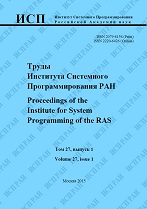|
This article is cited in 6 scientific papers (total in 6 papers)
The effect of partiality and adaptivity on the complexity of FSM state identification problems
H. Yeniguna, N. V. Evtushenkobcd, N. G. Kushike, J. Lópeze
a Sabanci University
b Tomsk State University
c Ivannikov Institute for System Programming, RAS
d National Research University Higher School of Economics (HSE)
e SAMOVAR, CNRS, Télécom SudParis/Université Paris-Saclay
Abstract:
State identification is a long standing problem in the area of Finite State Machine (FSM) based modeling and testing of discrete event systems. For the identification of the current state of the system, so-called homing and synchronizing experiments with FSMs are used whereas for the initial state identification one can perform a distinguishing experiment. The homing, synchronizing, and distinguishing experiments are known as “gedanken” experiments, and the sequences for these experiments can be derived for deterministic and nondeterministic, partial and complete specification FSMs that are used to formally represent the required behavior of systems under investigation. The problems of checking the existence and derivation of homing, synchronizing, and distinguishing sequences are known to become harder as a specification FSM turns to be nondeterministic and partial. It is also known that in some cases the complexity can be reduced through a ‘switch’ from preset to adaptive experiment derivation. In this paper, we study how the partiality and adaptivity affect the complexity of checking the existence of homing/synchronizing/distinguishing sequences for deterministic and nondeterministic FSMs and visualize the complexity issues via appropriate figures. We also mention that the existing solutions to state identification problems are widely used for verification and testing of finite state transition systems.
Keywords:
Finite State Machines (FSMs), state identification problems, complexity.
Citation:
H. Yenigun, N. V. Evtushenko, N. G. Kushik, J. López, “The effect of partiality and adaptivity on the complexity of FSM state identification problems”, Proceedings of ISP RAS, 30:1 (2018), 7–24
Linking options:
https://www.mathnet.ru/eng/tisp292 https://www.mathnet.ru/eng/tisp/v30/i1/p7
|

| Statistics & downloads: |
| Abstract page: | 181 | | Full-text PDF : | 70 | | References: | 25 |
|




 Contact us:
Contact us: Terms of Use
Terms of Use
 Registration to the website
Registration to the website Logotypes
Logotypes







 Citation in format
Citation in format 
